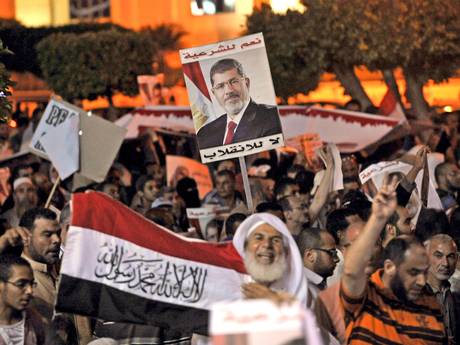 Egypt's new rulers said vigils by supporters of deposed President Mohamed Morsi threatened national security, and signalled that they would end them, setting up a potentially bloody showdown with the Muslim Brotherhood.
Egypt's new rulers said vigils by supporters of deposed President Mohamed Morsi threatened national security, and signalled that they would end them, setting up a potentially bloody showdown with the Muslim Brotherhood.
Thousands of Mr Morsi's Brotherhood supporters have camped out for a month at two sites in Cairo to protest against the army's overthrow of Egypt's first freely elected president on 3 July.
Almost 300 people have been killed in weeks of violence since the army deposed Mr Morsi, including at least 80 when security forces fired on his supporters marching from the main vigil at a mosque in northern Cairo.
In a televised statement, an interim cabinet installed by the military said “terrorist acts” and traffic disruption stemming from the protests were no longer acceptable and “represent a threat to Egyptian national security”.
“The cabinet decided to begin taking all necessary measures to address these dangers and put an end to them, commissioning the interior minister to do all that is necessary regarding this matter within the framework of the constitution and the law.”
Minutes earlier, judicial sources said authorities had referred the Brotherhood's supreme guide, Mohammed Badie, and two of its senior officials to court on charges of inciting violence. Badie has not been detained so far.
Such steps have raised global concern that Egypt's army-backed rulers will try to crush the Brotherhood, which emerged from decades in the shadows to win successive elections and take power after a 2011 revolt toppled veteran ruler Hosni Mubarak.
The Brotherhood, which has sworn to keep up its street vigils until Mr Morsi is reinstated, was defiant after the cabinet statement threatening to remove the protest camps.
“We don't recognise this government and we don't recognise the authorities or the laws they represent,” spokesman Gehad El-Haddad said.
Asked about the possibility of a crackdown, he said: “They tried to do that twice and they failed. They killed 200 protesters. Do they want to try that again?”
Last Friday the army urged Egyptians to take to the streets to give it a “mandate” to crack down on terrorism, a code-word used by the military for the once-banned Muslim Brotherhood.
Security forces have made no attempt to crack down on vast demonstrations by opponents of the Islamist movement.
Mr Morsi has been detained at an undisclosed military facility since the army shunted him from power on the back of mass protests against his year in power. He is under investigation on a raft of charges, including murder, stemming from his break-out from jail during the uprising against Mubarak.
The violence since Mr Morsi's overthrow has fuelled concern in the West of a wider conflagration in Egypt, which straddles the vital Suez Canal waterway and receives $1.3 billion a year in US military aid to bolster its 1979 peace treaty with Israel.
The European Union's foreign policy chief, Baroness Catherine Ashton, became the first outsider to see Mr Morsi this week, flown after dark by military helicopter to his secret place of confinement.
Baroness Ashton said he was in good health and she appealed to all sides to avoid violence. The United States, treading a fine line with a pivotal Arab ally, has also urged restraint.
An African Union delegation was given access to Mr Morsi today. It was unclear whether German Foreign Minister Guido Westerwelle, due in Cairo late tonight, would also see him.
Al-Ahram, a state-run news website, quoted Egypt's interim foreign minister, Nabil Fahmy, as saying Mr Morsi was not a “shrine” for visitors.



